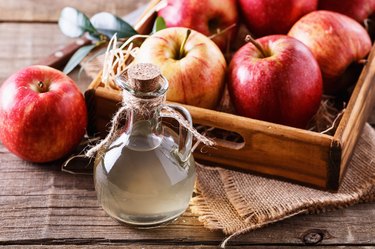
Do you refrigerate apple cider vinegar, or store it in your cupboard? Wondering if the bottle in your hand is still good? As it turns out, apple cider vinegar can last forever and doesn't need to be refrigerated.
Tip
Apple cider vinegar should be stored in a cool place, away from heat and sunlight. If stored properly, it can last many years.
Video of the Day
Apple Cider Vinegar Expiry Date
This popular food ingredient has been used for its flavor and healing power since ancient times. It's made from fermented apple cider and boasts a mild taste that complements salads, meat dishes, barbecue, sauces and dressings. You can even add a few drops to lemon water, smoothies or fruit juices to prevent blood sugar spikes.
Video of the Day
Read more: Bragg Apple Cider Vinegar & Weight Loss
But how long does apple cider vinegar (ACV) last? Does it ever go bad or can it last forever? Unlike most foods, this product can be used past its expiration date. In fact, it might even become safer over time because of the fermentation process, which kills harmful bacteria, said Donald W. Schaffner, Ph. D. in a July 2018 interview for Good Housekeeping.
According to the Vinegar Institute, ACV and vinegar products are self-preserving and can last forever. Lactic acid bacteria (LAB) produce a type of fiber known as the "mother" when converting apple cider into cider vinegar. This natural substance is harmless and indicates that the best part of the apple has remained intact, as Bragg points out.
Apple cider vinegar with the "mother" may have a strange appearance, but that doesn't mean it has gone bad. You may notice golden brown, string-like fibers, tiny particles or cloudy sediments at the bottom of the bottle. Most manufacturers eliminate the "mother" during processing. The downside is that vinegar products lacking this substance also tend to be lower in enzymes and minerals, according to Bragg.
How to Store Vinegar
Most types of vinegar may experience changes in color and texture as time goes by. However, this doesn't affect their nutritional value and shelf life. You can even shake the bottle to disperse "the mother." This substance is nutritious and may benefit your overall health. Although the Food and Drug Administration requires that manufacturers put an expiration date on the label, ACV can be safely used past this date.
There's a catch, though. You need it to store it properly, away from direct sunlight, advises Bragg. However, it's not necessary to refrigerate apple cider vinegar. Due to its high acidity, it's unlikely to become contaminated with fungi, bacteria and other pathogens.
Fermented beverages, including ACV, are safer than unfermented products, as reported in a July 2017 review published in the journal Microorganisms. Their safety is due to the lactic acid bacteria responsible for fermentation.
Apple cider vinegar, for instance, is rich in bacteria from the Acetobacter, Gluconobacter and Komagataeibacter species, reports Microorganisms. Although apple juice may be contaminated with Salmonella, E.Coli and other pathogens, LAB suppress their growth and metabolism.
In general, it's recommended to store apple cider vinegar in a cool place, away from heat and sunlight. Seal the bottle cap tightly after each use. You may keep it in the refrigerator if desired, but it's not necessary.
How to Cook With ACV
Apple cider vinegar isn't just for salads. It goes well with most dishes, from pickled eggs and coleslaw to marinades. The Academy of Culinary Nutrition recommends using ACV for pickling vegetables. Braised meat and vegetables will taste a lot better if you add two tablespoons of vinegar to the pan during cooking. Poached eggs will firm up in less time if you add a few drops of ACV to the hot water.
Culinary scientist Jessica Gavin recommends adding apple cider vinegar to baked beans, BBQ sauce, meatloaf, pulled chicken sandwiches and baked chicken. Taste of Home reports that that ACV helps tenderize beef, pork and other tough meats. On top of that, it can replace white vinegar in meat recipes.
If you're trying to cut calories, use apple cider vinegar in salad dressings, sauces and gravies. For example, mix it with extra virgin olive oil, salt, pepper and chili for a delicious, healthy dressing. One tablespoon of ACV has only 3 calories and 0.1 grams of carbs, so it's ideal for low-fat and low-carb diets. It's also rich in citrate and acetate, two compounds that may help prevent kidney stones.
Read more: Apple Cider Vinegar Detox Diet
- The University of Chicago Medicine: "Debunking the Health Benefits of Apple Cider Vinegar"
- Rutgers: "Donald W. Schaffner, Ph. D."
- Good Housekeeping: "4 Beverages You Should Never Drink Past the Expiration Date"
- Vinegar Institute: "Vinegar - Frequently Asked Questions"
- Bragg: "Apple Cider Vinegar FAQ's"
- Microorganisms: "Microorganisms in Fermented Apple Beverages: Current Knowledge and Future Directions"
- Academy of Culinary Nutrition: "20 Uses for Apple Cider Vinegar"
- Jessica Gavin: "Recipes With Apple Cider Vinegar"
- Taste of Home: "10 Unexpected Ways to Use Apple Cider Vinegar Around the House"
- USDA: "Apple Cider Vinegar"
- EBioMedicine: "Dietary Vinegar Prevents Kidney Stone Recurrence via Epigenetic Regulations"